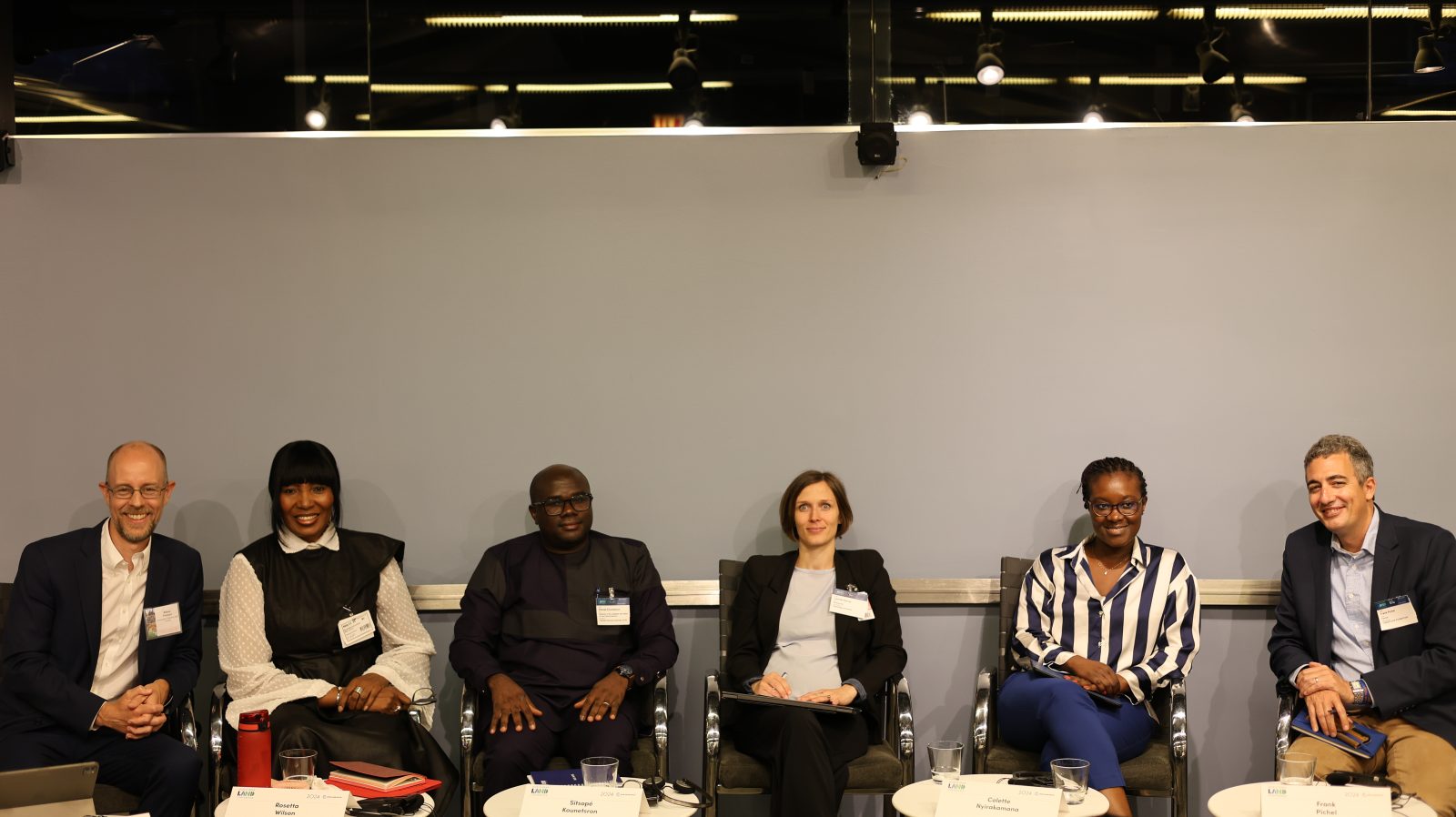LoGRI recently participated in the annual World Bank Land Conference in Washington, D.C., from May 13-17. This annual event gathers participants from governments, development agencies, civil society, academia, and the private sector to exchange knowledge, promote collaboration, advocate for evidence-based policymaking, and share innovative research.
This year’s theme, “Securing Land Tenure and Access for Climate Action,” highlighted the importance of secure land tenure and effective land governance in climate change adaptation and mitigation.
LoGRI’s Panel on Property Taxation, Land Management, and Sustainability
LoGRI hosted a panel titled “Leveraging Property Taxation to Strengthen Land Management and Sustainability,” moderated by Dr. Wilson Prichard, Chair of LoGRI, Executive Director of the International Centre for Tax and Development (ICTD) & Associate Professor at the University of Toronto. The panel featured
- Camille Barras, Policy Lead, LoGRI
- Dr. Colette Nyirakamana, Research Lead at LoGRI & Senior Research Associate at the University of Toronto,
- Frank Pichel, Land Information Specialist at PLACE,
- Rosetta Wilson, Independent Consultant & Program Lead FCDO-funded Property Tax Reform Project,
- Sitsopé Kounestron, Inspector of the Cadastre and Head of Land Tenure Section at the Togolese Revenue Authority (OTR).
The panel explored three key areas: (1) the benefits of simplified ‘property-tax first’ approaches to registration, (2) linking property tax revenues to service delivery to strengthen public trust, and (3) improving collaboration between tax and land authorities to improve land management, planning, and registration.
Successes of Property Tax Reforms in Lower-Income Countries
Panelists drew upon recent property tax reforms, like the 2019 initiative in Freetown, Sierra Leone, which addressed challenges in land administration and revenue generation by automating property identification and registration processes, using high-resolution satellite imagery and field verification. These reforms increased Freetown’s revenue potential five-fold and is now being replicated in Kenema, Sierra Leone. Sierra Leone’s flexible legislative environment facilitated these changes, enhancing fiscal capacity and trust in local governance. In addition, by enabling properties to be included in property taxation without identifying owners or requiring a land title, the process was greatly simplified and became more inclusive.
Sitsopé Kounestron discussed a similar approach in Togo, where the Revenue Authority developed a legal cadaster for formal land titling alongside a fiscal cadaster for tax purposes, allowing property registration without requiring ownership details. This strategy incentivized the separate but linked processes and reflects a trend towards simplified, property-tax-first approaches in lower-income countries, supported by adaptable legal frameworks.
Leveraging New Mapping and Property Data
Diagnostic surveys in West Africa revealed difficulties in completing land registries, leading to discussions on simplifying property tax systems. Camille Barras, drawing from experiences Togo, Benin, Cote d’Ivoire, and Senegal, stressed the need for strong property tax coverage and robust legal cadasters.
Key strategies included reducing inter-agency dependencies and using satellite imaging and GPS to update property data cost-effectively. Frank Pichel from PLACE addressed funding issues by leveraging high-resolution imagery and street view data, collected every two years and owned by partner governments. This approach supports inter-institutional data sharing, allowing common base maps to be used across various government functions, thereby enabling effective collaboration. He emphasized how leveraging these strategies and fostering intergovernmental cooperation can help governments achieve their goals more sustainably.
Linking Property Tax Revenue to Services
The panel emphasized how property tax reform can boost local government revenue and improve services. Colette Nyirakamana highlighted the need to link revenue initiatives with service delivery to build public trust and increase tax compliance. She noted that citizens often doubt that tax revenues will lead to public benefits.
Successful examples included Freetown’s participatory budgeting to fund climate resilience, sanitation, and transport, and similar strategies in other regions. Dr. Nyirakamana stressed the importance of clear communication and adaptable strategies, like publicly posting budgets in Malawi and using technology to raise awareness of tax obligations in Ghana’s Shama municipality. She also discussed earmarking revenues for specific services and ensuring clear links between taxes and services, while maintaining oversight.
Integrating Property Tax and Land Administration: Insights from Dr. Wilson Prichard’s contribution to UN-Habitat session
Dr. Wilson Prichard spoke at the UN-Habitat session “Revolutionizing Land Administration: Cadaster-First Versus Fit-for-Purpose and Property Tax-First,” where he discussed the benefits and trade-offs of these approaches. He emphasized that the “property tax-first” method can enhance tax systems and land administration. Using LoGRI’s success in Freetown, Sierra Leone, he stressed the need for tailored strategies in lower-income countries to improve property taxation and land titling. While “fit for purpose” land titling reduces costs and timelines, issues like corruption and reduced local control can threaten progress. Dr. Prichard concluded, “the next frontier of property tax reforms is to have these approaches be complementary, not parallel.”
Perspectives from the LoGRI Research Session in Exploring Collaborative and Innovative Approaches to Property Taxation
LoGRI team members presented at the Research Session “Using Property Taxation as a Basis for a Social Contract.” Nicolas Orgeira Pillai, Doctoral Fellow at LoGRI, explored Zambian taxpayers’ relationships with local councils and traditional leaders to determine if, and how, these two authorities should collaborate to improve property tax compliance. Dr. Colette Nyirakamana examined “Cadaster-First” versus “Property Tax-First” approaches, highlighting innovative methods for property registration and taxation in Africa. Kevin Grieco, Postdoctoral Fellow at LoGRI, discussed how linking property tax reform with participatory budgeting in Freetown, Sierra Leone, can enhance public trust and tax compliance.
The 2024 World Bank Land Conference emphasized innovative property tax and land administration as crucial for sustainable development and climate action. Collaboration and sharing successful models are vital for improving land management, fostering public trust, and ensuring fair property tax systems. LoGRI’s contributions showcase the transformative potential of property taxation in addressing global climate challenges, insecure land tenure, and ineffective land registration and valuation systems.
Hosted by: The World Bank

